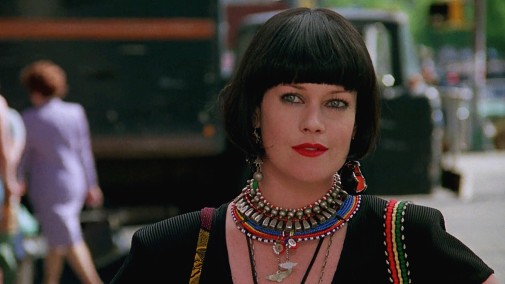
The 59th Academy Awards showcased a rare variety of genres in its acting honors. Usually, AMPAS restricts itself to prestige dramas, but they were atypically adventurous in 1986. Best Actress alone featured a sci-fi action epic, nostalgic time-travel fantasy, a black comedy on themes of suicide and murder, trashy neo-noir, and, of course, the respectable adaptation of a dramatic play. It's a pity that, amid all this, there wasn't space for some lighthearted romantic comedy. No matter how popular it is, it seems that genre always has some difficulty getting into the awards conversation. As for the 1986 crop of romcoms, none feels more like an "Almost There" case than Jonathan Demme's Something Wild. While arguments could be made for all its principal players, we shall focus on the picture's beguiling leading lady, Melanie Griffith…
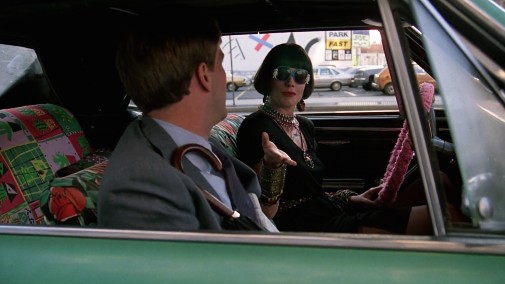
Something Wild starts with a bang and doesn't let the audience breathe for its entire first act, speeding along like an Old Hollywood screwball romance displaced to the 1980s. When a buttoned-up yuppie named Charles surreptitiously leaves a diner without paying for lunch, he's spotted by an eccentric woman who's quick to confront him. A vision of eclectic jewelry and a shoulder-padded black frock, Lulu follows the guy into the New York street and lets him know that not only has she seen his minor crime, she's also got him figured out. The unpaid lunch was no accident but a small act of rebellion. While her tone might initially denote an accusation, it soon morphs into something wilder. Her guileless eyes, modest smile, and airy speech patterns convey fascination instead of judgment.
Before Jeff Daniels' Charles knows it, the yuppie has been invited for a ride to work. But, of course, he soon finds out that his companion isn't interested in taking him to the office. Instead, she nonchalantly rides him off to New Jersey, throwing away his pager and indulging in shameless drinking while driving. It's one hell of an introduction, made all the more special by how Melanie Griffith underplays the character's "manic pixie dream girl" qualities. Instead of demonstrating Lulu's free-spiritedness with insistence, the actress follows a route of wise casualness tempered by good humor, an easy smile, and a twinkle of natural charm. We can't help but be seduced by Lulu, drawn into a mystery presented as unremarkable, even un-mysterious. That returns us to the genre disconnection at the heart of Something Wild.
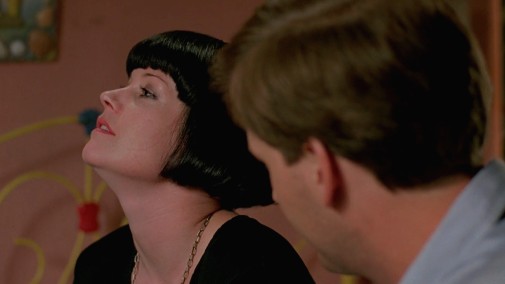
Griffith and Demme could have easily made Lulu up as a comedic femme-fatale, like a humorous twist on the tempting kidnapper of Detour's Ann Savage. Instead, she's more like Katharine Hepburn in Bringing Up Baby, only relaxing rather than aggravating. Simply put, the actress plays the character as someone whose bizarre behavior comes off as an organic manifestation of her personality. There's a self-knowing lark to her abrasive tactics, amusement that doesn't ever fall into self-parody. She's not putting on an artificial persona, though she lies a lot, nor an inhuman ideal. Instead, Lulu's a three-dimensional person to whom none of this impetuous lunacy is necessarily performative. Moreover, one feels that, even as the audience and Charles might be confused by the character, Griffith never is.
She knows the character inside out, making that confidence work as a safety net and the glue that keeps the comedy in one piece. Such descriptions might sound trite, but one shouldn't underestimate the tonal balance that E. Max Frye demands from its actors. It's a high-wire act from which many a tremendous thespian might have fallen. Watching Something Wild, it's easy to imagine other versions of the same story that derail towards oversimplification, that let the narrative's messiness kill its humanity. Two early examples that show Griffith's mastering of tonal variation are when Lulu wakes hungover and an impromptu detour into clothes shopping. In both instances, there's a temporary vacillation in the woman's assuredness, a glimpse into another side of Something Wild's leading lady.
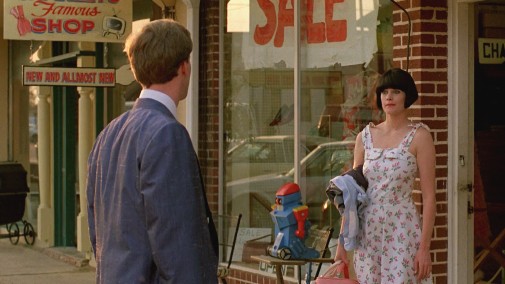
In the morning, after some drunken fun, she conveys the physical lethargy of waking up with a headache, using the visceral weakness to temper Lulu's apparent otherworldliness. Later, when revealing herself to Charles in a modest flowery number, Griffith almost replays their first encounter. This time around, though, it's she who stands awkwardly waiting for approval, dismissal, surprise, maybe even rejection. It's a shot of unexpected vulnerability that prepares us for the woman's next transformation. Lulu changes her name and hair color upon visiting her mom's house, calling herself Charles' wife. As it happens, she's named Audrey and, after sacrificing the brunette bob, the starlet becomes a poster child of old-school Americana with a blonde do and some breezy summer fashions.
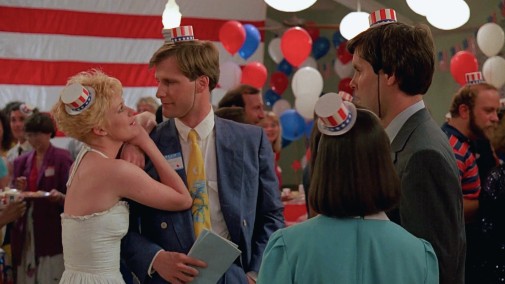
The personality is just the same, though, as flighty and strange as it's always been. Only we gradually come to understand the secrets of this lovestruck Audrey, immersing ourselves into her universe of impulsive romance. Demme's greatest trick is how he allows this evolving awareness to manifest without detaching us from Charles' perspective for the film's first half. Something Wild is primarily the leading man's movie, an odyssey of self-discovery, maybe self-improvement, prompted by the actions of an agent of chaos. That agent has agency, though, refusing reductive readings that might have flattened her into a plot mechanism, an object.
It's only as the hour mark arrives and a ghost from Audrey's past comes a-knocking that the camera switches strategies, developing the heroine's perspective separately from Charles. Audrey's real husband appears during a high school reunion and takes the other couple on a dangerous journey through robbery and painful memories. Ray, a violent ex-con, is played by Ray Liotta with mighty menace, a feral quality that contrasts with the movie's tone prior to his appearance. Before any exposition trots out, the audience is made keenly aware of the dynamic between the two unhappy spouses. The only needed indicator is the sullen energy in Griffith's closeups. It's as if Audrey's light fades in Ray's presence, Liotta's mercurial turn working as the catalyst that calms Griffith down into fear, into numb apathy.
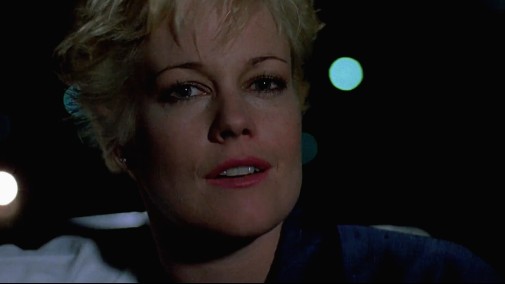
He makes her nervous and watching the actress play such beats after her earlier funny business is an exercise in queasiness. Erstwhile confident body language breaks apart in fidgety broken gestures, hands finding ways to shield the face, neck tense, head swiveling in search of an escape route. It's only logical that such negative emotions bleed into her relationship with Charles. Unidimensional fun sours, unspoken insecurities bloom, and comfortable silences become mired in sorrow. And yet, when all is said and done, Something Wild is still a romantic comedy. It's up to the actors to make the narrative arcs work out, to contextualize these extremities of feeling. Griffith, for her part, seldom falters. Watching Audrey lose and regain her light is a beautiful spectacle, punctuated by the tentative smile she sports for the movie's happy ending.
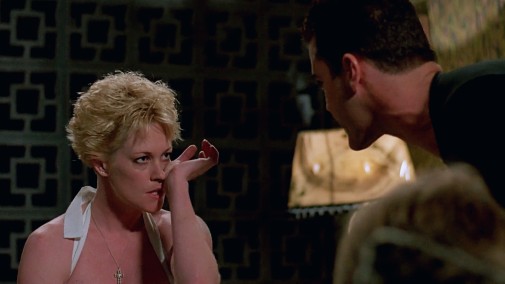
In the 1986/7 awards season, Melanie Griffith got a Golden Globe nomination for Best Actress in a Motion Picture – Comedy or Musical. Indeed, the HFPA went wild for the Something Wild actors, also nominating Daniels and Liotta. The latter got even more precursor love than Griffith, though it was she who had the "a star is born" momentum two years after getting standout notices and sex symbol status for Body Double. However, AMPAS chose five other thespians in 1986. That year's Best Actress Oscar nominees were Jane Fonda in The Morning After, Marlee Matlin in Children of a Lesser God, Sissy Spacek in Crimes of the Heart, Kathleen Turner in Peggy Sue Got Married, and Sigourney Weaver in Aliens. Matlin won, becoming the youngest Best Actress champion in Oscar history and the only deaf performer to win the trophy. A couple of years later, Griffith would get more love from AMPAS when she was nominated for Working Girl.
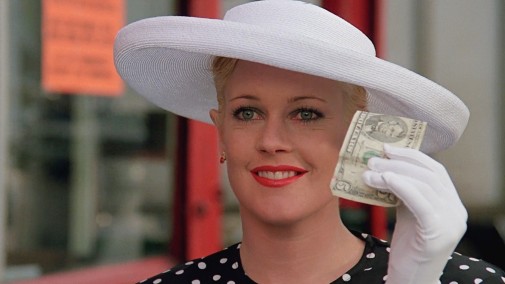
Something Wild is streaming on Amazon Prime and Pluto TV.